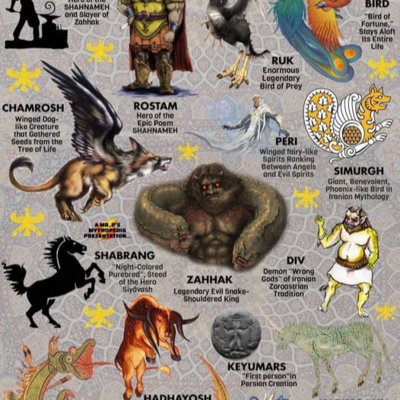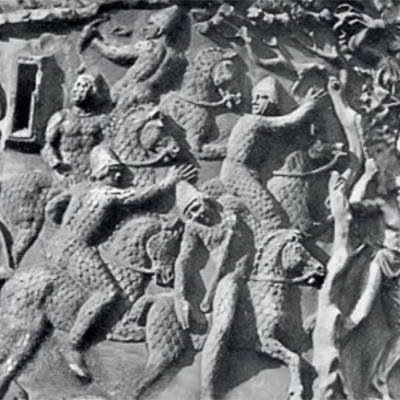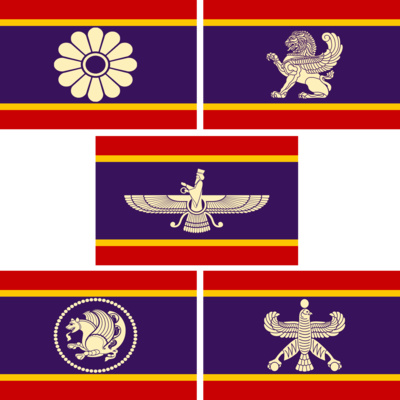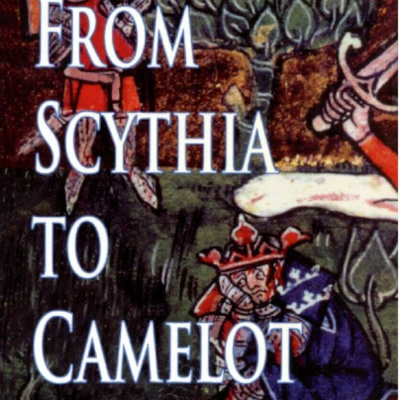
The Persian Version
By Arash Darius Kamali
Support: anchor.fm/arash-darius-kamali/support

The Persian Version Feb 08, 2023

Hyrcanian Storm, Iran's Revolutionary History with Dr. Jason Reza Jorjani
A discussion on the radical, Zoroastrian, Mazdakite, Sufi, antinomian and feminist roots of Iran's current revolutionary upheavals.

Iran's Marvelous Mythological Universe
The Iranian Mythological Universe

Iranic Settlers of Europe
This is the link to my new talk simulcast on my 'Persian Version' podcast and Jeff Lippman's excellent 'Garden of Doom' podcast, on the subject of my upcoming book and documentary project, currently in development, about the far too little discussed colonization of Europe by Northern-Iranic peoples such as the Scythians, Sarmatians, Alans, Roxalans, Iaziges, Aorsi, and Jasz.
We discuss the migrations and settlement of large parts of Eastern, Central, and Western Europe by these ethnically, linguistically and culturally Iranian peoples during the decline and fall of the Western Roman Empire.
We also get into the influence of these Iranic settlers on the material, literary, folkloric, artistic, cultural and genetic heritage of Medieval Europe, including their contributions to the stories of King Arthur and the Knights of the Round Table as well as to such medieval Romances as Tristan & Iseult, based on the older Parthian era Iranian story of Vis & Ramin.

The Persian Version on 'The Garden of Doom' Podcast
Dear members, this is an interview with me that just aired on Jeff Lippman's very interesting podcast series:
"The Garden of Doom."
Our conversation is about a range of topics including the origin and migrations of the Indo-Iranian Aryan peoples who were originally a part of the larger Indo-European ethnolinguistic family.
We discuss the development of the theology, cosmology and ethics of Iran's Avestan, Zoroastrian, and Mithraic traditions as well as the historic influence of these concepts on the Abrahamic religions of Judaism, Christianity and Islam.

The North-Iranian origins of King Arthur and the Knights of the Round Table; my conversation with Dr. Linda Malcor about her book 'From Scythia to Camelot'
I'm delighted and honoured to bring you my first podcast discussion with Dr Linda Malcor, co-author of
'From Scythia to Camelot'
This revolutionary book meticulously demonstrates that the core of the European stories of 'King Arthur and the Knights of the Round Table', Camelot and the Holy Grail is not entirely Gaelic, Celtic, or Ango-Saxon but North-Iranian!
The scholarly yet revolutionary book argues that many of these stories were brought to Western Europe by ethnolinguistically and culturally Iranian (i.e. Aryan), semi-nomadic chain mail armoured, equestrian peoples, such as the Sarmatians, Alans, Roxalans, Iaziges, Aorsi and others who migrated westward from their home on the Eurasian Steppes north of the Black Sea and settled much of Western Europe, including Britain during the decline and fall of the Western Roman Empire.

Persian, not Farsi!
In previous episodes we discussed how the name Iran, not Persia is actually the historic and correct name of the Iranian nation and civilization.
However, in this episode I’ll be making the case that when it comes to referring to the Persian language, the correct word in English is in fact Persian, not Farsi. Farsi is only the correct word--when you're speaking in Persian.
--A. Darius Kamali

Christianity as the gift from Indo-European Iran; the influence of Perso-Roman Mithraism on early Christianity
References: Axworthy, Michael (2008). A History of Iran. Basic Books. pp. 31–43.
Hone, William (1890 (4th edit); 1820 (1st edition)). "The Apocryphal Books of the New Testament". Archive.org. Gebbie & Co., Publishers, Philadelphia. See: Retrieved 26 January 2017.
Nersessian, Vrej (2001). The Bible in the Armenian Tradition. Getty. ISBN 978-0-89236-640-8.
Historia Trium Regum(History of the Three Kings) by John of Hildesheim (1364–1375)
Brock, Sebastian (1982). "Christians in the Sasanian Empire: A Case of Divided Loyalties". In Mews, Stuart (ed.). Religion and National Identity. Studies in Church History, 18. Oxford: Blackwell. pp. 1–19. ISBN 978-0-631-18060-9.
Ugo Monneret de Villard, Le Leggende orientali sui Magi evangelici, Citta del Vaticano, Biblioteca apostolica vaticana, 1952.
Hultgård, Anders (1998). "The Magi and the Star—the Persian Background in Texts and Iconography". In Schalk, Peter; Stausberg, Michael (eds.). 'Being Religious and Living through the Eyes': Studies in Religious Iconography and Iconology: A Celebratory Publication in Honour of Professor Jan Bergman. Acta Universitatis Upsaliensis: Historia Religionum, 14. Uppsala, Almqvist & Wiksell International. pp. 215–25. ISBN 978-91-554-4199-9.
Dietrich, "Die Weisen aus dem Morgenlande", Zeitschrift für die Neutestamentliche Wissenschaft, Bd. III, 1902, p. 1 14; cited in J. Duchesne-Guillemin, "Die Drei Weisen aus dem Morgenlande und die Anbetung der Zeit", Antaios, Vol. VII, 1965, pp. 234–252, 245; cited in Mary Boyce and Frantz Genet, A History of Zoroastrianism, Leiden, Brill, 1991, p. 453, n. 449.
Herzfeld, Ernst (1935). Archaeological History of Iran. Schweich Lectures of the British Academy. London: Oxford University Press. pp. 65–6. OCLC 651983281.
Dr. M. Moghadam ( ), second International Congress of Mithraic Studies, 1975.
Professor Parviz Varjavand ( ), Iranian archaeologist, studies on Mithraism and Iranian Archaeology.
Dr. Hashem Farhang, studies on Mithraism.
Professor Gary Leupp, studies on Mithraism;
D. Jason Cooper; Mithraic studies, 1996.
Richard Noll, Mithraic studies, 1997.
DI Behruz Vazvan ( ), studies on Christmas in the light of Mithraism and Zoroastrianism. One of the writers of the world s first Persian-Finnish-Persian Large Dictionary 1990.
Cumont, the mysteries of Mithra
Nabarz, the mysteries of Mithra
Foltz, Reliogions of Iran
Jason Reza Jorjani, Iranian Leviathan
Ruck, Muahrooms, Myth and Mithras

The Enduring Durant on Persia
As part of our introductory series for the Persian Version I felt there could hardly be a more appropriate voice to hear from regarding our topic, than that of the late great American philosopher, historian and popularizer of World History, Will Durant.
The following talk was originally presented as an address before the Iran-America Society in Tehran on April 21, 1948.
The great Will Durant provides a brief but insightful review of Persian cultural history and its influence on the history of human civilization.

Younan; or Greece--the Persian Version.
The ancient Greeks referred to all of Iran by the name 'Persia,' after the Parsua people of the ruling central region of 'Pars' with which they were most familiar. And the European West borrowed this term from the Greeks and the name has stuck to this day.
In a parallel irony, Greece is known as ‘Younan’ in Persian.
This is because the part of Greece that was most thoroughly colonized by Iran’s Achaemenian Empire was called 'Ionia.'
It turns out, the Iranians also used a short hand for the Greeks and referred to them all with the name of the region that they were most familiar with.

Iran vs Persia
When starting a discussion on a topic, it’s imperative to define terms and agree on proper usage of names--especially proper names.
And so doing a podcast like this one, presents us with a problem right from the get go.
Which is the correct name?
Is it Iran?
Or is it Persia?

What is Iran?
One must not think and speak of Persian/Iranian civilization as something restricted to the political boundaries of the Iranian nation state.
Culturally and historically, Iran-- or as the Sassanian Persians referred to it 'Eran Shahr'(the Aryan Realm)
is more a culture than it is a geographically restricted political entity. Like those other major civilizations of the ancient and classical world, Greece and Rome; Iranian/Persian influence stretches across large parts of the globe—both geographically and temporally. Aryanem Vaeja has encompassed and touched vast geographic regions. And it has both left its’ signature and, in turn, been influenced by the disparate cultures and regions with which it’s come into contact.

The Axis of Evil and the Origins of Evil
Zoroastrianism is a dualist faith that originated in Persia, and over the years it has influenced a number of other faiths. Even though we may not recognize it today, it has been an influence on a number of world religions, especially on Christianity and Islam. Zoroastrianism is a belief system that stresses how we as human beings were meant to strive for our full potential. A primary tenet of the faith is that righteous and upstanding people will participate in the rewards of paradise, while the evil-doers will undergo punishments in hell.

In the Name(s) of God
Politics begins with the way we use words, George Orwell reminded us. At a precarious moment for relations between Muslims and their others it is important to recall that Allah is not the name of the Muslim god; that God, Allah and Yahweh are different words for the same deity.
Link to origibal published essay.
https://bit.ly/3gHfrcP

Syria; a World War in miniature--perspective from Persia.
Open Democracy
Iraq and Syria: of memory and maps
https://bit.ly/36LuygR
The interests of outsiders, not those of the battered, bloodied and belittled peoples of Iraq and Syria, drive this brutal political theatre.
12 May 2018

The Persian Version; by Robert Graves
The Persian Version
by Robert Graves (1895-1985)
Robert Graves, a veteran of the First World War, wrote this poem during the the Second World War. The Persian version of the battle of Marathon is a counterattack on the Greek version of the story. The Battle of was fought in 490 BC. Presenting the history from the point of view of Persians, Robert Graves claims that the Persians had the more salutary demonstration in the battle.
The speaker in the poem accepts that the weather was adverse and attempts were ill starred, and the defense was strong. Despite these adversities, the outnumbered Persian expeditionary landing force had given the better performance on the battlefield. And that the story the Greeks have passed down is more in line with their theatrical tradition and less in line with history.
The Greeks may have written the history in their own favor; but through Graves’ piece, the Persians give their view on the matter.